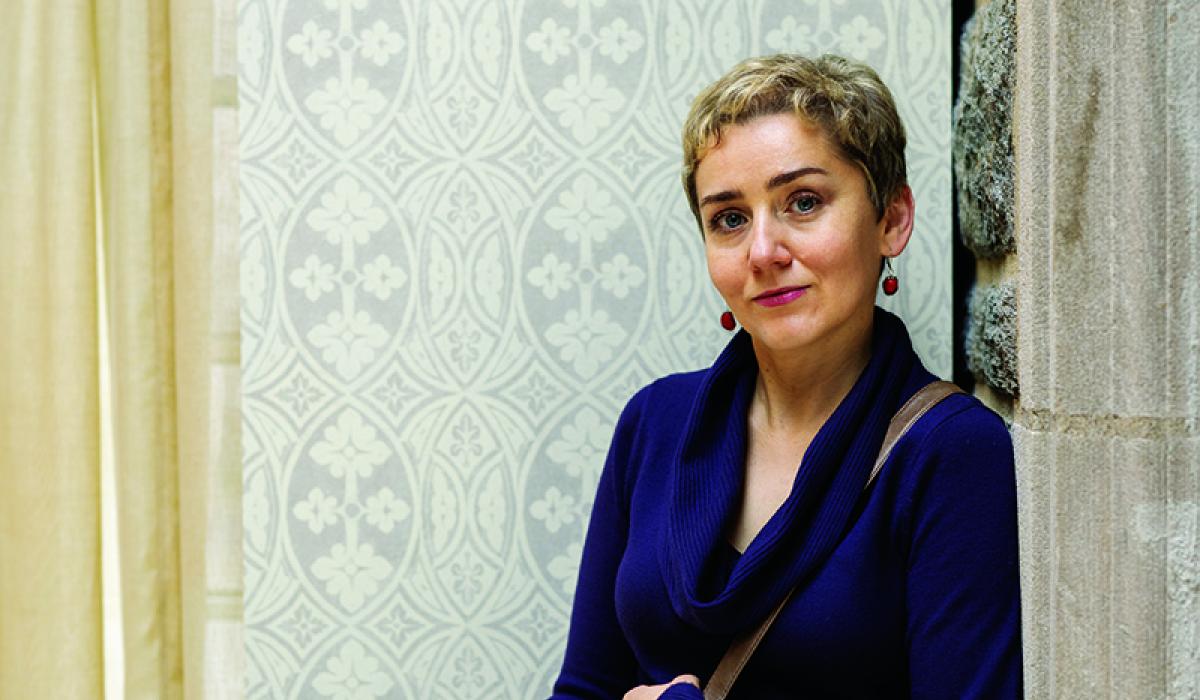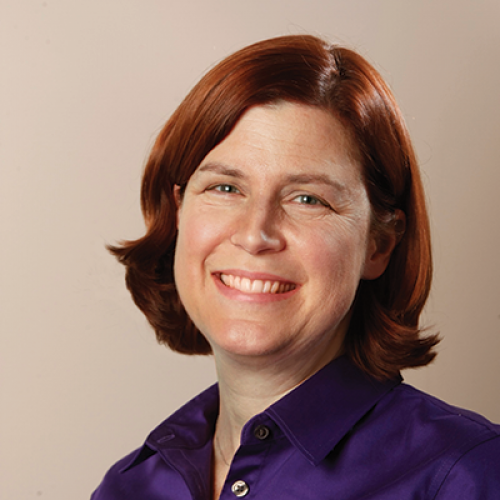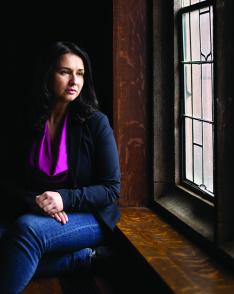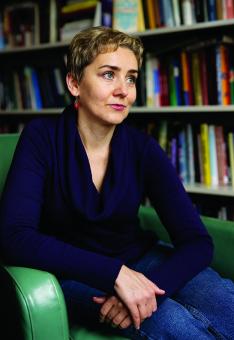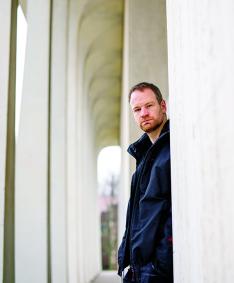Six months before Oksana Nesterenko arrived as a visiting scholar at Princeton, she was awakened in the night at her father’s apartment in Kharkiv, Ukraine, by the explosions of Russian missiles. “You couldn’t understand how far away it was,” she says, recalling the moment. “It may be in a couple of seconds you are going to be dead.
Nesterenko also feared the Russians might come for her. “Russians would consider me an American spy,” she says, because of her academic work promoting government transparency and the books she owns on subjects such as the U.S. Constitution.
At 5 a.m., she woke up her 6-year-old son and her 70-year-old father and began packing a few of her son’s clothes. “We moved without any food. We didn’t even take water,” she remembers. “I was paralyzed by fear. I just had energy to pack for my kid.” Over the next five days, they drove several hours a day, stopping each night at a friend’s place — or a friend of a friend — until they reached western Ukraine. Eventually they went to Prague.
Because her son is so young, he has taken his relocation to Princeton in stride: “He’s the only one who is not traumatized in our family.” Her father, also with her in Princeton, still speaks of returning to his home. “He wants to go back to his normal life, but I explain to him it’s impossible. He had a good life in Kharkiv, and someone just came and destroyed his life.”
Nesterenko is one of nine Ukrainian visiting scholars who, along with five Russian scholars, are part of a new program created by Princeton to offer refuge to academics affected by Russian leader Vladimir Putin’s war on Ukraine. They are working on their research, giving public lectures, and, in a few cases, teaching. Each scholar has a Princeton faculty mentor. Most live in the townhouses and apartments at the University’s Merwick Stanworth complex. Fifteen family members — spouses, children, and a parent — are here with them. Some Ukrainian scholars, though, prefer not to meet the Russians.
The program sprang from faculty members who felt the University needed to step in to help. The University has aided at-risk scholars since World War II, most recently those from Afghanistan and Puerto Rico. After getting the green light from the provost, the Princeton professors identified scholars who needed help and found academic departments to host them.
“Two days after the war [began], we said, ‘Something needs to be done,’ ” says history professor Ekaterina Pravilova, who is Russian but has lived in the United States since 2006. During the first days of the war, she cried frequently while reading the news, overcome by “this helplessness, this powerlessness. I’m Russian and I love my country, and what was happening was unthinkable.”
Pravilova saw a post on Facebook about former colleague Evgeny Roshchin, a dean at the Russian Presidential Academy of National Economy and Public Administration in St. Petersburg. A few days after the war began, Roshchin and other high-level university administrators were asked to sign a statement expressing support for the war. In a “reply all” email he sent to more than a dozen colleagues, Roshchin refused. He was anxious but, he says, “I realized this is the moment when we are crossing our own Rubicon. For me, it was a point of no return.”
A week later, he was called into the office of a senior administrator, who told Roshchin he would not be surprised if criminal charges were brought against him for an anti-war petition he had signed. A few days later, Roshchin handed in his resignation. Friends from the United States urged him to leave and offered help. In the beginning of April, after, he says, “a month of sleepless nights,” he packed a single suitcase and took a flight to Istanbul, leaving behind his wife and two children, ages 9 and 4.
“What he did is an act of civil courage,” Pravilova says. “He could have been put in jail for 10 years.” She reached out to Roshchin, asking him if he was interested in coming to Princeton.
After his escape to Istanbul, Roshchin spent five months traveling from one country to another so he wouldn’t run afoul of immigration rules, moving from Bosnia to Serbia, then Germany, and back to Serbia, where he reunited with his wife and children. They went to Bosnia, then Croatia, Montenegro, and back to Bosnia, staying in apartments and houses that friends from Western countries had lined up for him. Those friends also paid all his expenses; he didn’t take much cash out of the bank before leaving Russia so as not to arouse suspicion. His wife couldn’t bear to part with the family dog, Greta, but slots for pets were sold out on flights out of Russia, so Greta took a six-day van ride with other Russian dogs to Serbia.
In late August, the family arrived in Princeton, where University staff members helped get them settled in a townhouse, assisted in enrolling his eldest daughter at Johnson Park Elementary School, and explained the ins and outs of the U.S. health insurance system. Greta, the dog, is also here.
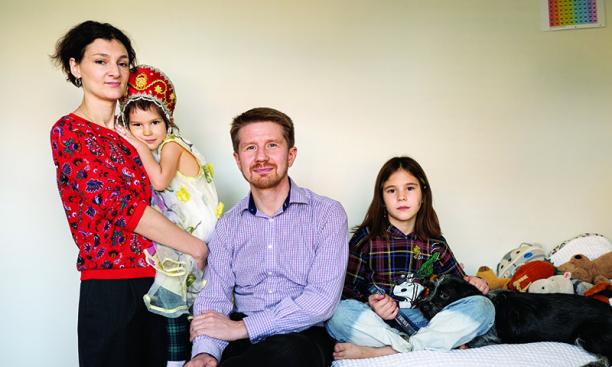
Roshchin is grateful to be at Princeton, but wary of being a citizen of the country waging an unprovoked war on Ukraine. “I’m hesitant to speak Russian in public spaces,” he says. He worries, too, about how the visiting scholars from Ukraine might feel about encountering him. “We all left for the same basic reason, but they left in a situation where they could hear bombs dropping, and we left from possible political persecution and because we did not want to be the cogs of the war machine. It’s not the same.”
Two days before the start of the war, Russian scholar Greg Yudin wrote an article for the online publication openDemocracy titled, “Putin is about to start the most senseless war in history.” At an anti-war protest on the day of the Russian invasion, he was beaten by police so severely that he was taken to the hospital. He suffered a concussion, but when asked, he prefers not to talk about it.
“Hundreds of thousands of Ukrainians are suffering from this brutal aggression,” he says. “Hundreds of thousands of Russians are suffering from this aggression, not even talking about Ukraine, where people have been killed, deprived of their homes, wounded, made refugees. In Russia, people are being tortured in prisons, sexually assaulted by police. Against this, what happened to me, a concussion, I don’t want to make too much attention to it. Compared to what people are suffering, it was just a holiday.”
He believes his responsibility, now that he is a visiting research scholar at Princeton’s School of Public and International Affairs (SPIA), is to speak publicly about the war and discuss his academic work in political philosophy, which focuses on studying public opinion in Russia and other countries. In Russia, he says, “there is widespread fatalism about politics. Do we protest against the rain if you don’t like the rain? You don’t protest. You just adapt. And that’s the same with politics in Russia.”
That outlook is not unique to the country, he points out. “The lack of collective political responsibility is a disease manifested in Russia in a particularly severe way, but I don’t think it’s a specifically Russian disease. Alienation from politics is a common disease. In Russia, it’s a pandemic of irresponsibility. Every single person has to take his individual responsibility.”
The passivity of the Russian people is infuriating for many of the Ukrainian scholars.
“We also had a dictator, an authoritarian leader,” says Yana Prymachenko, a visiting research scholar in the history department, referring to Ukrainian president Viktor Yanukovych, who was driven from office in 2014 after an uprising by the Ukrainian people. “We went out to huge rallies and stopped him, so I don’t understand why Russians couldn’t do it. Russian people say they were afraid to be arrested, afraid to be beaten. We were beaten. Unarmed people blocked the roads and did not let Russian tanks into their villages and towns. Thousands of people came out to rallies in occupied Kherson. So, we do not buy Russian excuses that they could not stop Putin.”
She is well-versed in the way Putin shapes public opinion: One of the topics she studies as a historian is Russian state propaganda. “It’s not pleasant work, because I have to deal with a great number of fakes and disinformation. It is a kind of twisted reality,” she says.
Like several of the Ukrainian scholars, Prymachenko prefers not to meet the Russian scholars in Princeton’s program. A planned lunch welcoming the scholars from both countries was canceled after University administrators realized that the Ukrainians did not want to attend such a gathering. Even the program’s title — Visiting Scholars from Ukraine and Visiting Scholars from Russia — telegraphs the tension.
“I do not see any point in these meetings,” Prymachenko says. “We have nothing to talk about. I assume that some of my Ukrainian colleagues expected to hear an apology for what the Russian army is doing in Ukraine. However, Russian scholars position themselves as victims of Putin’s regime. Therefore, they are not ready to take responsibility for what is happening in Russia. And that is the problem. Ukraine is the victim of Russian aggression, but Ukrainians are the fighters. So I believe that we have a completely different perspective and challenges now and in the future. Oil and water do not mix.”
When the war started, Prymachenko left Kyiv and went to Chernihiv to check on her 67-year-old mother, who lived alone. For several days, the pair slept in the basement. They used discarded shelves and a door from an old wardrobe to fashion makeshift beds, but it was very cold. Prymachenko’s asthma flared up. They slept in their clothes, and each packed one backpack with essentials. On March 3, the Russians shelled their street. Twenty-eight Ukrainians who were standing in line at the pharmacy were killed. Prymachenko decided they needed to leave immediately. Her mother didn’t want to go. They didn’t own a car, but a neighbor’s friend agreed to drive them to western Ukraine. During the journey, they realized it would be better to go to Poland. They crossed the border on foot, and Polish volunteers greeted them with tea and pastries.
“I left everything,” Prymachenko says. The experience of becoming a refugee has given her insight into another topic she studies: World War II. Also, “now I know how to make a Molotov cocktail,” she adds with the dark humor she shares with the other Ukrainians.
Prymachenko asked her mother to come to Princeton with her, but she wanted to return to Ukraine. She is now back in Chernihiv, where she has a gas stove, which means she can still cook during blackouts. She feels safe there, and neighbors who used to only exchange pleasantries “became very helpful and attentive to each other,” Prymachenko says. Every morning when she wakes up in Princeton, she calls her mother’s cell phone. Once there was no answer. Prymachenko panicked. After repeated calls, her mother answered. She insisted that her mother keep her phone close to her at all times.
Prymachenko’s next act in the morning is to check a phone app that shows which regions of Ukraine are under missile attack warnings. Then she reads the news. She repeats this before bed. “I understand there is no safe place in Ukraine,” she says. To manage her anxiety, she watches detective stories in the evenings. “I like this idea of justice because they find the murderer and punish him.”
Most of the scholars are spending the year focusing on their research, such as Sergii Kiiashko *18, an assistant professor at the Kyiv School of Economics who earned his Ph.D. from Princeton’s economics department. Anastasia Melnychenko, who is a professional specialist for the year at SPIA, is pursuing her own research on bullying while teaching online history classes to teenagers in Ukraine. “Half the class is absent because they don’t have electricity,” she says. Sometimes an air-raid alert starts during class, and her students must sign off to flee to a bomb shelter.
During the fall semester, there were several campus panel discussions on subjects related to the war, with visiting scholars from Ukraine and Russia speaking at separate forums. A few of the scholars are teaching. Mykola Riabchuk, who is serving as a lecturer and an associate research scholar in the politics department, co-taught a comparative politics seminar for undergraduates on Russian and Ukrainian history with Princeton professor Mark Beissinger. Yudin and fellow Russian scholar Arseniy Kumankov, a research scholar in politics, visited the class.
This spring, cultural historian Iuliia Skubytska is teaching “Trauma and Oral History: Giving Voice to the Unspeakable,” an undergraduate course on conducting oral histories with those experiencing trauma, from school shootings to the war in Syria to the Holocaust. She is drawing on her work as director of the Ukraine branch of the War Childhood Museum in Kyiv. When the war began, Skubytska hired a minibus and evacuated six people, a dog, and a cat to western Ukraine.
Her museum, with its main office in Sarajevo, collects testimonies from refugees — those who fled the Nazis up to Ukrainians who fled Crimea in 2014 when the Russians invaded. Now she was one of them.
The tight quarters of the minibus permitted just one bag per person. What someone packs when fleeing war is a subject the museum has examined.
“People all say the same thing: They believe they will be gone for a few days,” she says. “When I was packing, I also believed I was going away for a short time.” Nevertheless, she brought the pen her father gave her when she defended her dissertation.
Skubytska, an only child, left behind her parents, who are in their 60s. Their neighborhood in Kharkiv was regularly pummeled by shelling, so for a month they lived in the basement of the hospital where her father was an electrician. He felt he could not leave because his job was in the perinatal unit. Her mother helped in the hospital kitchen. They later rented a room in a village farther from the frontline. Today, they are staying in Kyiv, where Skubytska has rented an apartment for them, with time also spent in Kharkiv. They don’t want to leave Ukraine. “It’s a sense of home, a sense that this is their land,” Skubytska explains. Leaving one’s country can mean “not only losing your home but your whole way of life, and it can break you.”
The separation is painful for Skubytska. “At some point — when they were under shelling and decided to stay — I had to accept that my parents could die, and that would be their choice. Not their choice to die — that would be the Russians’ choice.” The hardest part of being in Princeton is “the feeling of: Where does my life make sense? Because one of the worst things one can experience during war is helplessness, the feeling you cannot affect anything at all.”
This is the second time Skubytska has been far from her country during a crisis with Russia. In 2014, when Putin annexed Crimea, she was in graduate school at the University of Pennsylvania. She worried so much about her parents and her country that it led to an eating disorder. Her recovery took three years. This time, she was psychologically more prepared. Her parents know that if they ever decide to leave Ukraine, she will support them financially.
“What is important for me is I maintain myself as healthy and stable enough to continue working and contributing the way I can to our victory,” says Skubytska, an associate research scholar affiliated with Princeton’s Program in Judaic Studies and other departments. That includes making financial donations to those still in Ukraine and gaining new scholarly skills at Princeton that will help her career and her country.
She reads the news “once a day, and I might forget [to look at the news]. It’s a psychological defense mechanism that turns on after half a year. At some point I just had to accept the fact that I’m not in the army. I can help our military by donating, but otherwise I really can’t help.”
For all the scholars, most of whom are in Princeton through September (one has a six-month appointment), the future looms as an unknown. “The hardest thing is the uncertainty,” Prymachenko says. “All my plans for the future were connected to Ukraine.” The University is providing one-on-one coaching to the scholars to help them find their next academic positions.
For Skubytska, a trip back to Kyiv in August to see her parents provided some comfort. She needed to say “my proper goodbyes” to Kyiv. “The sad truth is you never know how much you are tied to your land until you are forced to leave it.”
Jennifer Altmann is a freelance writer.

